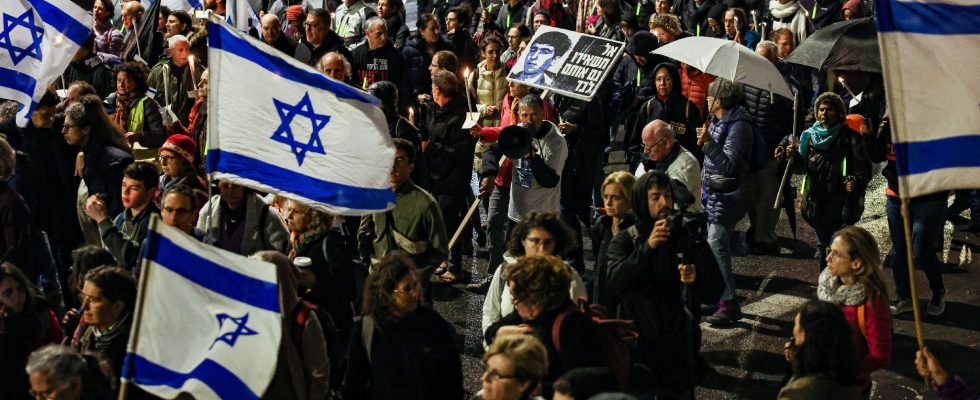Noaf pulls from his coat an Israeli passport so new that its cover cracks. On Wednesday evening, the sixty-year-old, wearing a red and white keffiyeh, left Israel for the first time, also his first plane flight. Sitting on the sofa in this Parisian apartment, in the second arrondissement, he doesn’t dare go out. Too many people, too much noise, and then he doesn’t speak French or English, he’s afraid of getting lost, he stays there, motionless, shivering under his piled coats. “I didn’t know where France was on a map”, he says plan, not map, nor atlas. Since the morning, he has been responding to the journalists who parade in front of him, same questions, same answers, same story. “It’s not a great pleasure to talk,” he adds. At his side, Fouad is agitated, he wants to show the video found on social networks, where we see his son Samer. Face bloodied, the hostage is held by his captors and their wreath of assault rifles encircles his broken figure. The very young man, 22 years old, has his eyes closed, his head down. He was captured on Kibbutz Nir Am, where he worked as a farm worker, in charge of raising battery chickens. Fouad, father of ten children, sits down again, on his cell phone he watches this video again and again, the last image of his son. He knows he is alive, one of the released Thai hostages confirmed it to him, they were held together. Noaf doesn’t have a video, he prefers chronology. He recounts the beginning, “the black day”, as he calls it, on October 7 when his brother Yosef, 53, and his three children were kidnapped by Hamas in Kibbutz Hulit. That morning, Yosef was accompanied by Hamzah, Bilal and Aisha, he finished milking the cows, they walked towards the olive grove. Then, the carnage. Jews, Muslims, kibbutzim, Bedouins, all killed, raped, beaten, injured, massacred, captured together. Ten days ago, two of Yosef’s children returned from Gaza: Aisha, 16, and her brother Bilal, 21, exchanged by their captors during the truce. They now live with their uncle Noaf, they told him about their captivity in “a place without light”, they pray for their father, lacking his daily insulin, and their brother Hamzah.
These Bedouin families of the seven Muslim hostages initially tried to negotiate on their own. Noaf explains that he looked for points of contact in Gaza, initially wary of Israeli support associations. Then he realized that they, the Muslim Bedouins, were once again the stateless, tribes without labels, without evidence, anomalies. “Hamas considers us worse than the Jews because we are Israeli and Muslim,” he adds. He wants to convince people that he can do nothing if he was born in this disorder of the world, this nameless village, somewhere in the Negev desert, a traveling hamlet. With his hands, he describes cooking on a gas stove, no electricity, his house where only the ceiling “is solid”. He multiplies the stories supporting both his helplessness and his spirit of harmony, the pancakes he cooks for Israel’s national holiday, the coffee he slowly cooks for his friends on the kibbutz, he asks let us take note of the advice of his grandfather, a Bedouin like him. His grandfather told him to always “eat with the Jews and sleep with the Christians.” We are surprised. Yes, eat with Jews because their kosher will suit Muslim dietary precepts, and bed with Christians because as they sleep in the morning, they will be able to quietly perform their morning prayers there. He would like us to believe him, he insists, he doesn’t care about politics, hatred, other people’s religions. After these impossible solitary negotiations, Noaf, son of the desert, changed his mind two weeks ago. Via intermediaries, he made contact with Emilie Moatti, the former Labor MP, running the hostage house. The Israeli Muslim Bedouins now wanted to be supported like the others, like the families of Israeli Jewish hostages. “We felt that we did not exist alone. The Bedouins came to see us at our home, but that was not enough, we understood that we had to go out so that we did not forget our hostages,” explains- he.
Mahmoud is much younger than Noaf. The thirty-year-old wears a leather jacket and large sunglasses; his father was captured in Kibbutz Magen. Mahmoud had his passport made at Tel Aviv airport; until then, he had never needed one. He took a different flight than the other members of the small Bedouin delegation who came to Paris. Emilie Moatti had organized a taxi for him, she had repeated to him that when his plane landed at Roissy, he had to get out, look for the gentleman holding a sign with his name in Arabic in his hands, get into the car of this gentleman who would lead him to her, in Paris. However, this Thursday, December 14, nothing went as planned. While the former MP meets the MPs with Noaf and Fouad, Mahmoud does not arrive. Two hours late, three, almost four. She calls him on his cell phone. Mahmoud tells him that he respected his instructions. He got out of the plane. He took a chair, he sat down, as she said. But he doesn’t see any man with a sign and his name. Can he describe to her what he sees around him? asked Emilie, patience like an angel, face exhausted. Yes, there are suitcases that turn, turn, turn. And in everyone’s heads, this dizziness of being caught in an endless drama, which turns, turns, turns.
